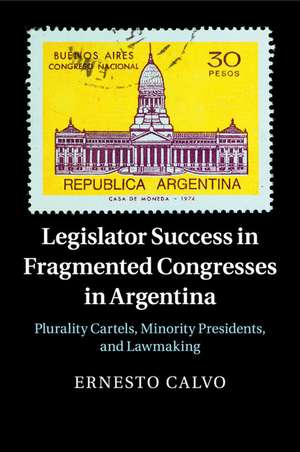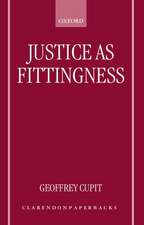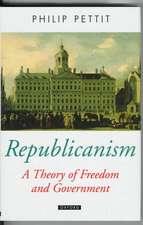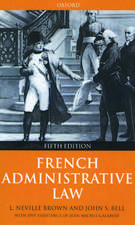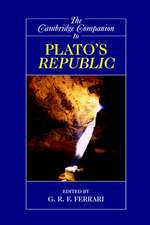Legislator Success in Fragmented Congresses in Argentina: Plurality Cartels, Minority Presidents, and Lawmaking
Autor Ernesto Calvoen Limba Engleză Paperback – 12 iul 2017
| Toate formatele și edițiile | Preț | Express |
|---|---|---|
| Paperback (1) | 282.26 lei 43-57 zile | |
| Cambridge University Press – 12 iul 2017 | 282.26 lei 43-57 zile | |
| Hardback (1) | 693.36 lei 43-57 zile | |
| Cambridge University Press – 15 iun 2014 | 693.36 lei 43-57 zile |
Preț: 282.26 lei
Nou
Puncte Express: 423
Preț estimativ în valută:
54.01€ • 56.53$ • 44.95£
54.01€ • 56.53$ • 44.95£
Carte tipărită la comandă
Livrare economică 31 martie-14 aprilie
Preluare comenzi: 021 569.72.76
Specificații
ISBN-13: 9781107676671
ISBN-10: 1107676673
Pagini: 234
Ilustrații: 32 b/w illus. 24 tables
Dimensiuni: 153 x 230 x 14 mm
Greutate: 0.32 kg
Editura: Cambridge University Press
Colecția Cambridge University Press
Locul publicării:New York, United States
ISBN-10: 1107676673
Pagini: 234
Ilustrații: 32 b/w illus. 24 tables
Dimensiuni: 153 x 230 x 14 mm
Greutate: 0.32 kg
Editura: Cambridge University Press
Colecția Cambridge University Press
Locul publicării:New York, United States
Cuprins
1. Plurality parties, plurality cartels, and legislative success; Part I. Plurality Cartels: 2. Party blocs, committee authorities, and plurality cartels; 3. A statistical model of legislators' success and productivity; Part II. Legislator Success and the Sequential Organization of the Legislative Process: 4. Electoral fragmentation and the effective number of legislative blocs; 5. Legislator success and the committee system in Argentina; 6. On the plenary floor: special motions, vanishing quorum, and the amendment of the plenary schedule; 7. Legislative success in the House; Part III. Beyond Plurality Cartels: 8. The determinants of the president's legislative success; 9. Plurality-led congresses with limited gatekeeping authority: the House of Representatives in Uruguay; 10. Concluding remarks: plurality-led congresses as a research agenda.
Recenzii
'When can legislative coalitions succeed by virtue of disciplined voting, when by virtue of agenda-setting prowess, and when by combining these capacities? Ernesto Calvo's gem of a book takes on these classic themes, powerfully illuminating both the tangled web of Argentine democracy and the politics of legislative control more broadly.' Gary W. Cox, Stanford University, California
'Ernesto Calvo's book is impressive on many fronts. Calvo marshals systematic empirical measures of key concepts in the study of legislative politics and analyzes them in a sophisticated yet transparent manner. More importantly, he extends our theoretical understanding of the workings of legislatures in presidential systems. Most fundamentally, Calvo points out that in multiparty systems no single party, government or opposition, is likely to have a majority of seats and that theories that assume the presence of unified or divided government are in many ways inadequate. In plurality-led congresses, rules are used differently, the venues in which key decisions get made shift, and, ultimately, policy outcomes are not the same.' Brian F. Crisp, Washington University, St Louis
'Ernesto Calvo has written a wonderful book, an example of how to put together theoretical and empirical work. With rigor and sound and sophisticated analysis, Calvo demolishes folkloric views about Argentinean and Uruguayan congresses. The conclusions are far reaching, extending well beyond these two cases. Legislatures controlled by a plurality are pretty common, if not prevalent, in most scenarios. Calvo shows that they are not bound to paralysis or crises or to be dominated by presidents. The message generalizes Mayhew: 'without majorities we govern', as Calvo himself notes.' Fernando Limongi, Universidade de São Paulo
'Calvo has again shown his sharp eye for defining both a research question and a theoretical solution. His methodological sophistication, extensive database, and detailed case work then provide ample evidence to support his claims about the inner workings of 'plurality-led' congresses. He shows that rather than generating gridlock, bills are often passed through committees with a variety of partisan coalitions. These patterns, he argues, are the result of legislative rules and the partisan makeup of the committees.' Scott Morgenstern, University of Pittsburgh
'As Calvo points out, despite the vastness of the literature on the American Congress there is only a limited amount of variation over time in partisan configurations, electoral linkages, and legislative rules. In this wonderful book, he explores in Argentina and Uruguay the theoretical relevance and empirical consequences of a circumstance unknown to Congress: plurality control of the legislature. In the process he shatters a host of misconceptions about that circumstance and takes a leading role in a recent renaissance of comparative legislative research on Latin America.' David W. Rohde, Duke University, North Carolina
'Ernesto Calvo's book is impressive on many fronts. Calvo marshals systematic empirical measures of key concepts in the study of legislative politics and analyzes them in a sophisticated yet transparent manner. More importantly, he extends our theoretical understanding of the workings of legislatures in presidential systems. Most fundamentally, Calvo points out that in multiparty systems no single party, government or opposition, is likely to have a majority of seats and that theories that assume the presence of unified or divided government are in many ways inadequate. In plurality-led congresses, rules are used differently, the venues in which key decisions get made shift, and, ultimately, policy outcomes are not the same.' Brian F. Crisp, Washington University, St Louis
'Ernesto Calvo has written a wonderful book, an example of how to put together theoretical and empirical work. With rigor and sound and sophisticated analysis, Calvo demolishes folkloric views about Argentinean and Uruguayan congresses. The conclusions are far reaching, extending well beyond these two cases. Legislatures controlled by a plurality are pretty common, if not prevalent, in most scenarios. Calvo shows that they are not bound to paralysis or crises or to be dominated by presidents. The message generalizes Mayhew: 'without majorities we govern', as Calvo himself notes.' Fernando Limongi, Universidade de São Paulo
'Calvo has again shown his sharp eye for defining both a research question and a theoretical solution. His methodological sophistication, extensive database, and detailed case work then provide ample evidence to support his claims about the inner workings of 'plurality-led' congresses. He shows that rather than generating gridlock, bills are often passed through committees with a variety of partisan coalitions. These patterns, he argues, are the result of legislative rules and the partisan makeup of the committees.' Scott Morgenstern, University of Pittsburgh
'As Calvo points out, despite the vastness of the literature on the American Congress there is only a limited amount of variation over time in partisan configurations, electoral linkages, and legislative rules. In this wonderful book, he explores in Argentina and Uruguay the theoretical relevance and empirical consequences of a circumstance unknown to Congress: plurality control of the legislature. In the process he shatters a host of misconceptions about that circumstance and takes a leading role in a recent renaissance of comparative legislative research on Latin America.' David W. Rohde, Duke University, North Carolina
Notă biografică
Descriere
Through detailed analyses of legislative success in Argentina and Uruguay, this book explores the determinants of law enactment in fragmented congresses.
